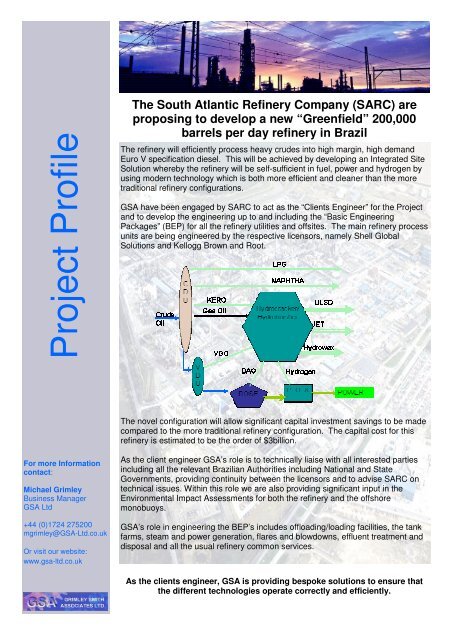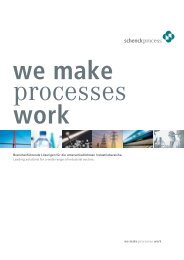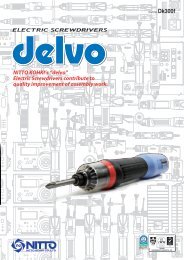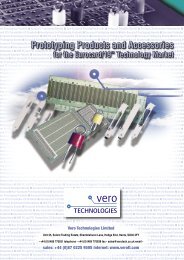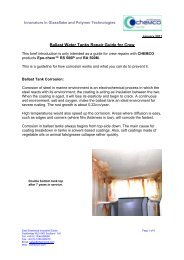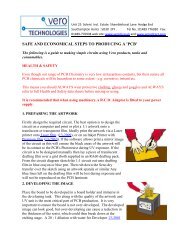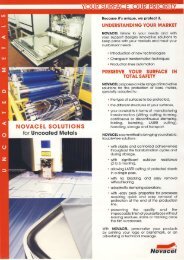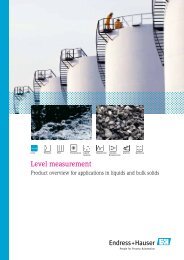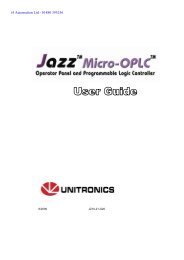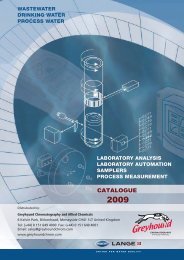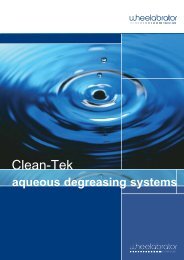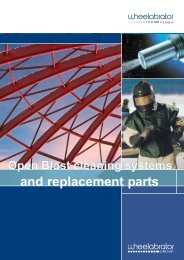The South Atlantic Refinery Company (SARC) are proposing
The South Atlantic Refinery Company (SARC) are proposing
The South Atlantic Refinery Company (SARC) are proposing
Create successful ePaper yourself
Turn your PDF publications into a flip-book with our unique Google optimized e-Paper software.
Project Profile<br />
For more Information<br />
contact:<br />
Michael Grimley<br />
Business Manager<br />
GSA Ltd<br />
+44 (0)1724 275200<br />
mgrimley@GSA-Ltd.co.uk<br />
Or visit our website:<br />
www.gsa-ltd.co.uk<br />
<strong>The</strong> <strong>South</strong> <strong>Atlantic</strong> <strong>Refinery</strong> <strong>Company</strong> (<strong>SARC</strong>) <strong>are</strong><br />
<strong>proposing</strong> to develop a new “Greenfield” 200,000<br />
barrels per day refinery in Brazil<br />
<strong>The</strong> refinery will efficiently process heavy crudes into high margin, high demand<br />
Euro V specification diesel. This will be achieved by developing an Integrated Site<br />
Solution whereby the refinery will be self-sufficient in fuel, power and hydrogen by<br />
using modern technology which is both more efficient and cleaner than the more<br />
traditional refinery configurations.<br />
GSA have been engaged by <strong>SARC</strong> to act as the “Clients Engineer” for the Project<br />
and to develop the engineering up to and including the “Basic Engineering<br />
Packages” (BEP) for all the refinery utilities and offsites. <strong>The</strong> main refinery process<br />
units <strong>are</strong> being engineered by the respective licensors, namely Shell Global<br />
Solutions and Kellogg Brown and Root.<br />
<strong>The</strong> novel configuration will allow significant capital investment savings to be made<br />
comp<strong>are</strong>d to the more traditional refinery configuration. <strong>The</strong> capital cost for this<br />
refinery is estimated to be the order of $3billion.<br />
As the client engineer GSA’s role is to technically liaise with all interested parties<br />
including all the relevant Brazilian Authorities including National and State<br />
Governments, providing continuity between the licensors and to advise <strong>SARC</strong> on<br />
technical issues. Within this role we <strong>are</strong> also providing significant input in the<br />
Environmental Impact Assessments for both the refinery and the offshore<br />
monobuoys.<br />
GSA’s role in engineering the BEP’s includes offloading/loading facilities, the tank<br />
farms, steam and power generation, fl<strong>are</strong>s and blowdowns, effluent treatment and<br />
disposal and all the usual refinery common services.<br />
As the clients engineer, GSA is providing bespoke solutions to ensure that<br />
the different technologies operate correctly and efficiently.
Project Profile<br />
For more Information<br />
contact:<br />
Michael Grimley<br />
Business Manager<br />
GSA Ltd<br />
+44 (0)1724 275200<br />
mgrimley@GSA-Ltd.co.uk<br />
Or visit our website:<br />
www.gsa-ltd.co.uk<br />
Yemen Oil Field Developments<br />
Crude Processing Facility (CPF) Improvements<br />
<strong>The</strong> scope of this project was to<br />
condition the produced water<br />
from an existing field (operated<br />
by the end client DNO) for<br />
reinjection underground into the<br />
reservoir. <strong>The</strong> existing CPF had<br />
not been built to handle the large<br />
quantities of water which <strong>are</strong><br />
currently being extracted. To<br />
handle this water GSA have<br />
designed a system using a<br />
combination of Skim Tanks,<br />
Surge Tank, Polishing Filters<br />
(future), and Injection Pumps with<br />
the required utility services.<br />
In addition GSA have engineered the expansion of the CPF including a manifold,<br />
two three phase separators along with a suitable fl<strong>are</strong> system that can cope with<br />
the maximum gas flow from the wells.<br />
New Field Development<br />
A new site is being developed by our<br />
client DNO for which GSA <strong>are</strong><br />
engineering the crude production<br />
facility. This is to replace an existing<br />
temporary exploration treatment plant<br />
and will utilize some of the services.<br />
<strong>The</strong> project requires the transport of<br />
the product crude to another<br />
production facility for final separation<br />
of the crude before export. In addition<br />
the gas extracted is to be used for fuel<br />
gas on the CPF site and at another<br />
site 23km away. <strong>The</strong> gas will require conditioning prior to this, including<br />
dehydration before entry into the transport pipeline. <strong>The</strong> remaining gas will require<br />
suitable fl<strong>are</strong> systems.<br />
Prior to the installation of the temporary facility, GSA also carried out initial<br />
engineering of the CPF including extensive simulation modelling using different<br />
throughput rates and pressures from the field. <strong>The</strong> client is currently implementing<br />
this work.<br />
Test Facilities or Full Capacity Crude Processing Facilities; GSA has the<br />
capability and experience to develop suitable sites cost effectively and<br />
quickly.
Project Profile<br />
For more Information<br />
contact:<br />
Michael Grimley<br />
Business Manager<br />
GSA Ltd<br />
+44 (0)1724 275200<br />
mgrimley@GSA-Ltd.co.uk<br />
Or visit our website:<br />
www.gsa-ltd.co.uk<br />
Kharg and Lavan Islands Processing Plants<br />
Refurbishment and Debottlenecking Project<br />
This project is being carried out for the Iranian Offshore Oil <strong>Company</strong> (IOOC) a<br />
subsidiary company of the National Iranian Oil <strong>Company</strong> (NIOC).<br />
With Our Iranian joint venture partner Hirgan Energy Engineering. <strong>The</strong> project will<br />
result in almost 70,000 man-hours of design work for the partnership for the<br />
upgrade of three oil facilities in the Persian Gulf.<br />
<strong>The</strong> work scope for each facility involves the design and techno-economic<br />
evaluation of a number of possible conceptual design options for the upgrades for<br />
each facility and to then aid the client in selecting a preferred option for which GSA<br />
will complete the Front End Engineering Design and prep<strong>are</strong> procurement<br />
documentation to allow the client to move into a construction phase.<br />
<strong>The</strong> main part of the development is the<br />
debottlenecking and renovation of up to 4 onshore<br />
crude oil primary processing facilities<br />
at Kharg Island. Each facility processes<br />
crude from a particular field in the<br />
gulf. <strong>The</strong>re <strong>are</strong> options to either upgrade the<br />
units in the existing facilities or replace them<br />
by building an entirely new unit capable of<br />
meeting a processing capacity of around<br />
300,000 barrels a day.<br />
<strong>The</strong> second development, also associated<br />
with Kharg Island, is to resolve corrosion<br />
problems in the subsea transfer line to the<br />
on-shore plant by removing water from the oil<br />
at the well production platforms before it is<br />
pumped to shore. This project goal is to<br />
reduce the water percentage to about 0.2 per<br />
cent by volume.<br />
Work at the third facility, on Lavan Island, is safety related involving the installation<br />
of Fire and Gas Detection systems, an upgrade and extension of the fire fighting<br />
systems and the provision of a new control room with modern DCS control<br />
facilities.<br />
Test Facilities or Full Capacity Crude Processing Facilities; GSA has the<br />
capability and experience to develop suitable sites cost effectively and<br />
quickly
Project Profile<br />
For more Information<br />
contact:<br />
Michael Grimley<br />
Business Manager<br />
GSA Ltd<br />
+44 (0)1724 275200<br />
mgrimley@GSA-Ltd.co.uk<br />
Or visit our website:<br />
www.gsa-ltd.co.uk<br />
Vanadium and Nickel Recovery from <strong>Refinery</strong> and<br />
Power Station Residues<br />
Increasing demand for oil has lead to wider use of heavy crudes such as those<br />
from Venezuela and Canada, these crudes contain quantities of vanadium and<br />
nickel which concentrate in residues such as gasifier soots, flexicoke and power<br />
station ashes. In addition, desulphurisation and demetallisation catalysts used by<br />
refiners contain quantities vanadium, nickel and often molybdenum.<br />
GSA have a record in recovery of these metals<br />
going back almost ten years as designers,<br />
installers and latterly operators of a Metals<br />
Recovery Plant in Harwich. <strong>The</strong> plant continues to<br />
operate as a viable stand alone business and<br />
as a vehicle to support project work on oil<br />
industry residues.<br />
Venezuela<br />
GSA is currently working on a scheme to recover vanadium pentoxide from<br />
flexicoke residues arising at Amuay <strong>Refinery</strong> in Venezuela. <strong>The</strong> project is being<br />
carried out on behalf of PDVSA, the refinery owner, through their technology arm,<br />
Intevep. <strong>The</strong> project has progressed through laboratory trials to full-scale plant<br />
trials so far 2000 tonnes of flexicoke have been sent to the plant and <strong>are</strong> being<br />
processed. Processing is proceeding well with very high quality vanadium<br />
chemicals being produced for sale for use as catalysts. A full scale scheme for a<br />
plant to treat 25,000 tonnes of flexicoke has now bee proposed to Intevep and we<br />
expect to begin the design work in Q4 2007.<br />
Europe<br />
GSA has conducted laboratory trials for Shell Global Technologies to provide a<br />
design basis for the treatment of residues from Shell licence gasifiers. <strong>The</strong> work<br />
has shown that ammonium metavanadate can be produced from the residues. This<br />
AMV can be further processed to produce vanadium pentoxide and fused flake.<br />
GSA has applied for a patent on the process and is working with Shell to develop<br />
this technology<br />
Brazil<br />
<strong>The</strong> <strong>South</strong> <strong>Atlantic</strong> Refining <strong>Company</strong> plant in<br />
Sergipe will use GSA technology to treat<br />
gasifier residues.<br />
United Kingdom<br />
GSA <strong>are</strong> currently considering building a<br />
process plant in the UK to exploit the recovery<br />
and extraction technology.<br />
GSA has the experience and ability to test, develop and realise metals recovery<br />
potential with the additional benefit of understanding the metals bulletin<br />
markets
Project Profile<br />
For more Information<br />
contact:<br />
Michael Grimley<br />
Business Manager<br />
GSA Ltd<br />
+44 (0)1724 275200<br />
mgrimley@GSA-Ltd.co.uk<br />
Or visit our website:<br />
www.gsa-ltd.co.uk<br />
Plant Conversion Project—Lubricant to Biodiesel<br />
GSA were initially approached by a multinational PMS company who had been engaged to<br />
prep<strong>are</strong> an appraisal of an existing, partially decommissioned, chemical factory prior to<br />
acquisition. GSA were tasked to carry out a technical evaluation of the existing site and<br />
equipment including an assessment of potential future environmental liabilities. On balance<br />
the overall appraisal was positive and resulted in the acquisition of the site. GSA were then<br />
retained to carry out the design and project management activities necessary to bring the<br />
factory back into operation and convert it to the<br />
manufacture of biodiesel fuel.<br />
<strong>The</strong> main tasks were:-<br />
1) Initial Site Appraisal Stage<br />
• Review existing historical contaminated land<br />
surveys<br />
• Conduct gap analysis between information<br />
available and historical use and carry out risk<br />
assessments<br />
• Review maintenance and inspection histories for main site equipment to form an<br />
assessment of condition and remaining life<br />
• Survey infrastructure and assess condition including steam, compressed air, cooling<br />
water, power (HV and LV), control systems, etc.<br />
• Preliminary ‘order of magnitude’ assessment of costs for reversal of<br />
decommissioning and conversion to biodiesel production<br />
2) Detailed Design<br />
Following acquisition of the site GSA took on responsibility for project management<br />
including all detailed design. <strong>The</strong> design was carried out on a reimbursable basis and<br />
involved:-<br />
• Process development from client R&D to identify how best to reconfigure the site for<br />
production of biodiesel<br />
• Process design & new equipment specification and selection<br />
• Reconfiguration of old pipework systems and specification of new<br />
• Overhaul of main equipment for reuse<br />
• Electrical and Instrumentation systems overhaul/reconfiguration/renewal<br />
• Liaison with Environmental, Planning and HSE bodies<br />
3) Site Management<br />
GSA engineers oversaw all site installation work and the plant was tested and<br />
commissioned successfully by GSA in 7 months from initially being acquired by the Client.<br />
GSA has in depth understanding of ass aspects of biodiesel manufacture<br />
including novel process development and off-the-shelf technology


